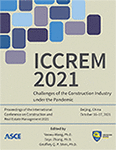Automatic Construction of Building Code Graph for Regulation Intelligence
Publication: ICCREM 2021
ABSTRACT
Building codes are composed of a set of requirements that govern the design, construction, and maintenance of buildings and structures. Currently, most building codes are stored in unstructured text-based documents. However, with the advance of artificial intelligence, these unstructured building codes are no longer meet the requirements toward regulation intelligence scenarios such as design compliance review, relation analysis, and so on. To address this problem, this research proposes a method to automatically collect and formalize building codes and transform them into a knowledge graph representation. The method mainly consists of three steps: (1) data collection, which automatically collects building codes by crawling data in the web; (2) data structuring, which automatically transforms text-based building codes (e.g., HTML and PDF) into XML structure; and (3) graph generation, which transforms XML-based building codes into Neo4j graph database. The proposed method is implemented and tested in a case study. The result demonstrates the feasibility of the method and shows that the generated knowledge graph can support multiple regulation intelligence scenarios such as regulation relation retrieval, regulation conflict analysis, design compliance review, and so forth.
Get full access to this article
View all available purchase options and get full access to this chapter.
REFERENCES
Fernandes, D., and Bernardino, J. (2018). “Graph databases comparison: Allegrograph, Arangodb, Infinitegraph, Neo4j, and Orientdb.” Proceedings of the 7th International Conference on Data Science, Technology and Applications, Porto, Portugal, 373–380.
Liang, T. X., Li, B., and Zhao, G. M. (2011). “The summary of environmental protection laws in regulations intelligence retrieval system research.” Shandong Chemical Industry, 40(9), 40–43. (in Chinese).
Lin, J. R., and Guo, J. F. (2020). “Automatic compliance checking in building and construction area.” Journal of Tsinghua University (Science and Technology), 60(10), 873–879. (in Chinese).
Nawari, N. O. (2018). Building information modeling: automated code checking and compliance processes, CRC Press, Boca Raton.
Solihin, W., Dimyadi, J., Lee, Y.-C., Eastman, C., and Amor, R. (2017). “The critical role of accessible data for BIM-based automated rule checking systems.” Proceedings of the Joint Conference on Computing in Construction, Heraklion, Greece, 53–60.
Zhang, J., and El-Gohary, N. M. (2017). “Integrating semantic NLP and logic reasoning into a unified system for fully-automated code checking.” Automation in Construction, 73, 45–57.
Zhou, P., and El-Gohary, N. (2016). “Domain-specific hierarchical text classification for supporting automated environmental compliance checking.” Journal of Computing in Civil Engineering, 30(4), 04015057.
Information & Authors
Information
Published In
Copyright
© 2021 American Society of Civil Engineers.
History
Published online: Dec 9, 2021
Authors
Metrics & Citations
Metrics
Citations
Download citation
If you have the appropriate software installed, you can download article citation data to the citation manager of your choice. Simply select your manager software from the list below and click Download.
